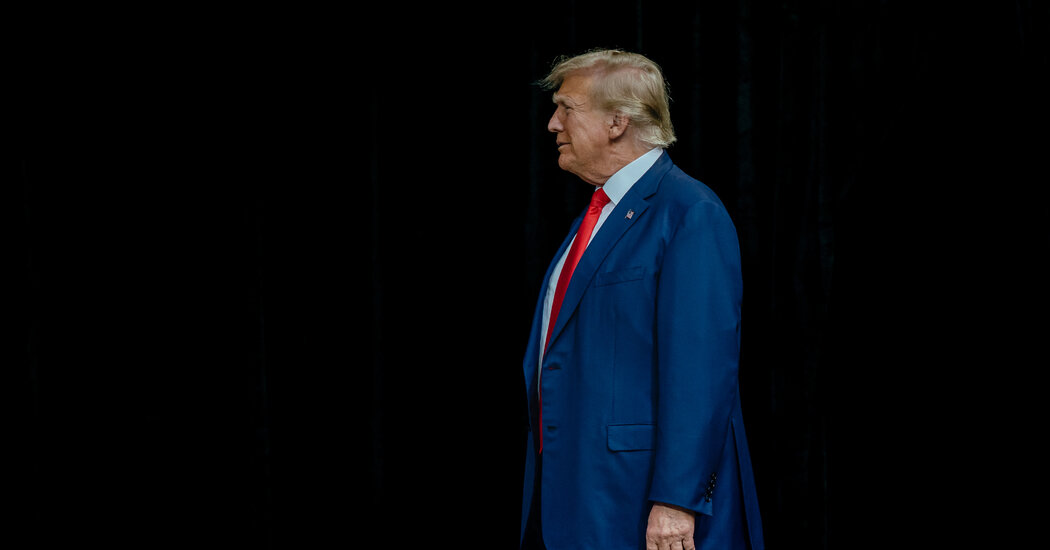For the past few weeks, lawyers for former President Donald J. Trump and federal prosecutors have been arguing about a touchy subject: Should Mr. Trum
For the past few weeks, lawyers for former President Donald J. Trump and federal prosecutors have been arguing about a touchy subject: Should Mr. Trump, accused of mishandling classified documents, be allowed to discuss the secret papers with his lawyers in the secure facility he once used as president at Mar-a-Lago — the very place the F.B.I. swooped down on last summer to retrieve some of the records after he failed to return them?
On Wednesday, Judge Aileen M. Cannon, who is presiding over the documents case, gave an answer to that question — albeit one that was rather vague. In an order setting up a series of rules to protect the classified materials at the heart of the proceeding, Judge Cannon said that Mr. Trump would indeed need to use a secure facility to review the sensitive records, but she did not specify where that facility would be.
The dispute about how and where Mr. Trump could talk about the secret papers in the case began last month when his lawyers asked Judge Cannon to allow him to re-establish the sensitive compartmented information facility, or SCIF, “at or near” Mar-a-Lago, his private club and residence in Florida, that he once used for classified materials when he was president.
The property was already protected by the Secret Service, the lawyers wrote, and permitting Mr. Trump to talk there about the classified documents likely to emerge during his case would cut down on the “immense practical and logistical hurdles and costs” of having him travel to a SCIF in Miami or another nearby city run by the courts.
Prosecutors working for the special counsel, Jack Smith, objected to the notion of Mr. Trump having such discussions at Mar-a-Lago, which not only gets hundreds of visitors a year, but was also where the former president haphazardly kept boxes of classified materials stacked up in a bathroom and atop a ballroom stage. As the prosecutors told Judge Cannon, Mr. Trump was seeking “special treatment that no other criminal defendant would receive.”
“In essence,” one of the prosecutors, Jay I. Bratt, wrote, “he is asking to be the only defendant ever in a case involving classified information (at least to the government’s knowledge) who would be able to discuss classified information in a private residence.”
In her order, which came one day after a sealed hearing on these issues in Federal District Court in Fort Pierce, Fla., Judge Cannon fully granted the government’s motion for a protective order over the classified materials, suggesting she agreed with everything the prosecutors had asked for.
But the judge appeared to leave the issue of where to house the SCIF unresolved, saying only that a court-appointed security officer would ensure that a secure facility (with “secure office equipment”) would be “accessible” to Mr. Trump and his lawyers during business hours and “at other times upon reasonable request.”
Protective orders are a routine part of criminal cases, especially those involving classified documents. Generally, the orders are meant to guard against the premature release of sensitive evidence or to ensure that important information in the case is used as part of the proceeding itself and not to try the matter in the media.
But the order that Judge Cannon issued on Wednesday had a subtext. It touched upon the knotty issue of what, if any, accommodations should be made to a former president on having legal conversations about the same classified documents that the government claims he illegally took with him from the White House.
Prosecutors in the documents case had initially proposed barring Mr. Trump from even reviewing some of the classified discovery evidence — a position that seemed to outrage the former president’s lawyers.
Even though the government has since backed away from that suggestion, one of the lawyers, Christopher M. Kise, expressed shock about it in a filing to Judge Cannon last month, writing that it was unusual given that Mr. Trump was “the 45th president of the United States and, as such, had access to and knowledge of each and every one of our nation’s most sensitive secrets.”
The indictment filed against Mr. Trump in the classified materials case accuses him of illegally holding on to 32 documents in violation of the Espionage Act. It also charged him with conspiring with two co-defendants — Walt Nauta, one of his personal aides, and Carlos De Oliveira, the property manager at Mar-a-Lago — to obstruct the government’s repeated efforts to retrieve the sensitive materials.
www.nytimes.com

COMMENTS